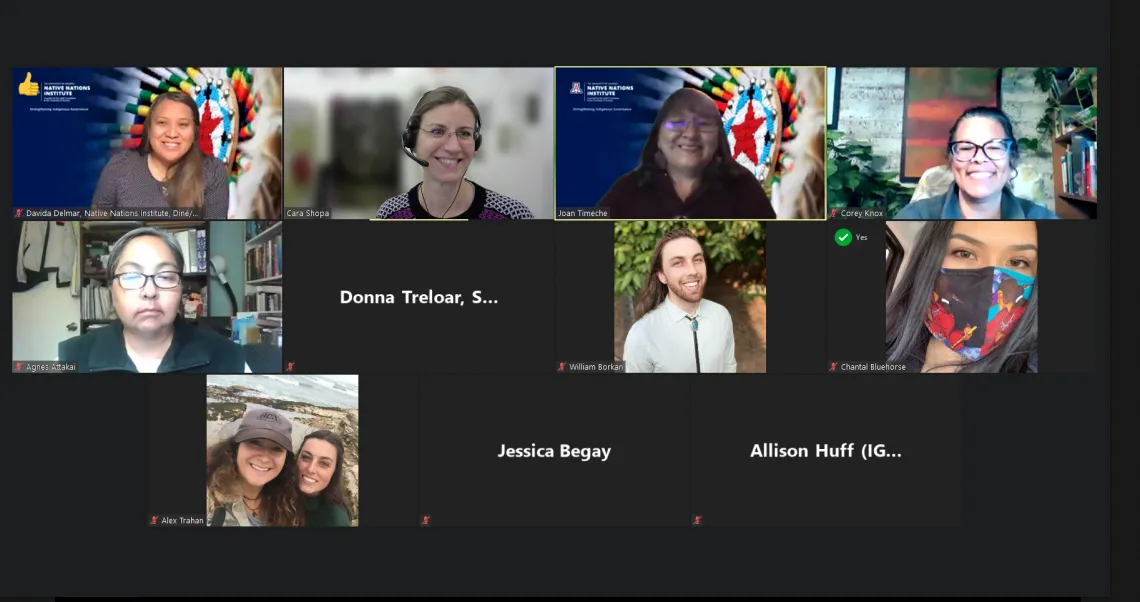Communicating for Societal Impact Workshop Series

The Communicating for Societal Impact Workshop series was held virtually from March 22nd to March 25th. The eight training sessions provided additional resources for Sloan Scholars, Indige-FEWSS Trainees, and Diné College Bridge to STEAM Scholars to build skills in effective communication and community-engaged research.
The workshop series provided a connection between community leaders and the future generation of STEM professionals. UArizona and Diné College students practiced multiple approaches to engaging diverse audiences about their research.
Kathryn Kellner of Human Communication Studio started the workshop series giving her expert insight on communicating science to a professional audience. Coming well-prepared for the transition between zoom and in-person presentations, Kellner touched on skills for presenting both virtually and in person. Some key points included stance, voice, eye gaze and behind-the-scenes props to deliver a poised, personal and professional presentation. Kellner finished her presentation focusing on capturing the audience through engaging videos and presentations. A special thank you to Kellner and the staff at the Human Communication Studio for providing the workshop attendees with free access to their online resources.
“Why should your audience care?” was the guiding question for the presentation held by Neha Gupta, a Ph.D. student in the Department of Hydrology and Atmospheric Sciences and program coordinator for the University Climate Change Coalition program. Gupta emphasized the importance of human connection when communicating one’s research. Students crafted “elevator pitches” to share the real-world impact of their research with a general audience.
Day Two continued with Valentina "Tina" Andrew of Tohono O'odham Young Voices Podcast who demonstrated the importance of Storytelling in creating meaningful connections between the speaker and the audience. Attendees were engaged in a case study that sparked a lively discussion about research with tribal communities.
Native Nations Institute carried the attendees through Day 3 of the workshop with emphasis on Project Facilitation skills with Native Nations. The “Focus Conversation Method” and the “Strengthening Indigenous Governance” approach were two of the highlights that the NNI practiced with the attendees. NNI’s Joan Timeche and Devida Delmar shared their expertise on leadership training concepts.
Dr. Celina Valencia and Dr. Felina Cordova-Marks from the UA College of Medicine, Cancer Division, started Day 4 of the workshop with Data Science, Data Management, and Data Sovereignty. Dr. Valencia and Dr. Cordova-Marks shared the importance of proper data collection and management with regard to tribal data sovereignty. The attendees learned about mining large data sets and the relevance of data science.
The workshop concluded with Dr. Ramiez-Andreotta, Assistant Professor and Director of both Project Harvest and Gardenroots. Case studies illustrated the ins and outs of community member engagement and environmental injustices. Dr. Ramiez-Andreotta highlighted the benefits of communities’ actively participating in the research that addresses their quality of life and how students could engage.
Our partners in sponsoring this workshop series were the University of Arizona-Sloan Indigenous Graduate Partnership (UA-SIGP) and the Indigenous Graduate Education in Science and Engineering - Southwest (IGESE-SW). Program Coordinator Cara Shopa worked closely with Donna Treloar, Director of Diversity Programs and UA-SIGP administrator, and Dr. Allison Huff, Assistant Professor in Family & Community Medicine and co-PI of IGESE-SW. Beyond offering major coursework and research opportunities, the Indige-FEWSS NSF Research Traineeship provides graduate students with a foundation in science communication. To provide such opportunities, Indige-FEWSS partners with programs offered at the University of Arizona that support Native American students and Native initiatives.
We would like to extend a special thank you to all of our sponsors and to all of the presenters for providing our Trainees with this opportunity.
